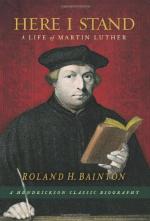
|
| Name: _________________________ | Period: ___________________ |
This test consists of 15 multiple choice questions and 5 short answer questions.
Multiple Choice Questions
1. What doctrine does the church maintain?
(a) the Roman pontiff as the infallible rule of faith
(b) the authority to decrease time in purgatory
(c) the right to question the Pope's edicts
(d) the authority of the Bible
2. Why does Luther preach against indulgences?
(a) to offer a better way of making money
(b) to make a name for himself
(c) to warn his parishioners against spiritual pitfalls
(d) to see if anyone is listening to him
3. What does the church, according to Bainton, readily admit today?
(a) that the indulgence traffic saved the church from ruin
(b) that the indulgence traffic was a scam
(c) that indulgences are correct but given too freely during Luther's time
(d) that the indulgence priviliedge was often given too incorrectly
4. Where is Luther's trial transferred?
(a) from Germany to Rome
(b) from Germany to Spain
(c) from Rome to Germany
(d) from Rome to Jerusalem
5. Who is the disruptive Humanist of Luther's day?
(a) Melanchthon
(b) Erasmus
(c) Wycliffe
(d) Frederick the Wise
6. To whom are the ninety-five theses given?
(a) to the rubbish collectors
(b) to the Pope
(c) to the printer for all Germany
(d) to the archbishop
7. What is Humanism?
(a) the belief that the proper interest of mankind is man
(b) the idea that humans invented God
(c) the theory that humans are part of God
(d) the belief that there is no God
8. When are Luther's primary works delivered to the printer?
(a) during his trial
(b) late in 1522
(c) the summer of 1520
(d) Christmas of 1521
9. What does Luther deny?
(a) the Pope's power to release from or consign people to purgatory
(b) that he has said anything against the Pope's power
(c) that he is suffering from delusions
(d) that he received his word by Divine revelation
10. In what area does Luther distinguish himself at the university?
(a) as a defender of the Catholic church
(b) as a parochial preacher
(c) as a student advocate
(d) as a lecturer on the Apostle Paul
11. What do both Humanism and the Reformation do but for different reasons?
(a) keep peace among the people
(b) make peace with the Pope
(c) attack indulgences
(d) accept the Papal position
12. What drives Luther to make extra long confessions?
(a) to earn extra indulgences to shorten his time in purgatory
(b) to get out of doing boring work
(c) to let the confessor see how religious he is
(d) to be sure that he remembers and confesses every one of his sins
13. Why is Luther not worried about what the opposition will do to him?
(a) because his popularity with the people will save him
(b) nothing can happen except for what God above allows
(c) the canonists have no power over him
(d) because he is safe as long as he stays in Germany
14. What realization does Luther come to in Wittenberg?
(a) He can never do enough to save himself.
(b) He is wrong to opposed the Pope.
(c) There are no hard answers in the Bible.
(d) He does more than necessary to save himself.
15. Which of Luther's family members greatly opposed his joining the monastery?
(a) his mother, Margaretta
(b) his younger brother
(c) his father, Hans
(d) his wealthy uncle
Short Answer Questions
1. What does Luther vow to do?
2. How can many of Luther's supporters be classified?
3. Why does Luther reject the idea that Christ is sacrificed again at the Lord's Supper?
4. What is the first point of the Cum Postquam?
5. What do the parishioners do when Luther refuses to sell indulgences?
|
This section contains 658 words (approx. 3 pages at 300 words per page) |

|




